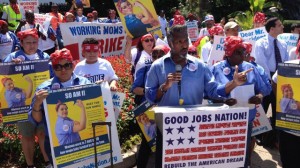
Striking federal contract workers call for the right to bargain collectively in front of the White House, June 23, 2014. (Image: Good Jobs Nation)
Hundreds of women struggling to make ends meet on the low wages paid by federal contractors went on strike in Washington, DC, today. Dressed as the World War II icon “Rosie the Riveter,” the women walked off the job at 50 profitable companies that get a large share of their business from federal contracts. They’re demanding that President Obama sign an executive order allowing them to bargain collectively for better pay, decent health care and paid sick leave. This “new Rosie” campaign has been organized by Good Jobs Nation, a coalition of progressive labor unions and community groups.
The strikers are rallying at the National Zoo, just a few blocks from where the president is holding a summit on family-friendly workplace rules. (The US is one of four countries in the world that doesn’t mandate paid maternity leave — the other three are in the developing world — and only about half of US workers have access to job-protected sick leave.)
In the past year, these contract workers have gone on strike seven times. In February, they scored a victory when Obama signed an executive order mandating that workers on future federal contracts be paid a minimum wage of $10.10 per hour. And last week, the White House announced that it was issuing another order barring federal contractors from discriminating against workers on the basis of sexual orientation.
Organizers of today’s action say that granting these workers the right to bargain collectively with their bosses would give them the negotiating power they need to make future interventions from the executive branch unnecessary.
Indirectly, through its extensive network of private contractors, the federal government is the largest low-wage employer in the US. At the same time, taxpayers are required to pick up the tab for up to $950,000 in salary for each executive at these contracting firms — a figure that rose by 48 percent between 2004 and 2013, after adjusting for inflation.
A study released last week by Robert Hiltonsmith and Lew Daly at Demos, a progressive think tank, found that raising the standards of the federal contracting workforce would have a significant ripple effect throughout the economy.
Among the report’s findings:
- At least 21 million people — 8 million workers and their families — rely on low-wage jobs in the federally-supported economy; that is, jobs with firms that receive a significant portion of their revenue from federal funds.
- Over 70 percent of these workers are women and nearly 45 percent are people of color — which makes the federal government the largest funder of low-wage employment for working women and people of color.
- With robust action to raise workforce standards in the federal footprint, more than 8 million lower-wage households and twenty million people will see at least a 20 percent increase in their living standards.
- Gains for these workers and their families will pay additional dividends in terms of growth, employment and fiscal returns: we will see additional GDP growth of about $31 billion annually along with more than 260,000 additional jobs; $6.8 billion in new tax revenue and nearly $9 billion in fiscal savings from the SNAP, EITC and Medicaid programs can be expected annually.
- Higher workforce standards in the federal footprint could also help to raise workforce standards in the broader economy, particularly through the effects of competition within sectors, but also by signaling that raising workforce standards is a national priority.
Hiltonsmith and Daly urge the federal government to achieve that goal by allowing the workers to bargain together, demanding that contractors offer living wages and decent benefits, enforcing existing labor laws that protect workers from being ripped off by their bosses and requiring that contractors pay their top execs no more than 50 times what their median workers earn.
You can read the entire study, “Underwriting Good Jobs,” at Demos. And to find out more about today’s strike, or get involved in the campaign, check out Good Jobs Nation.


